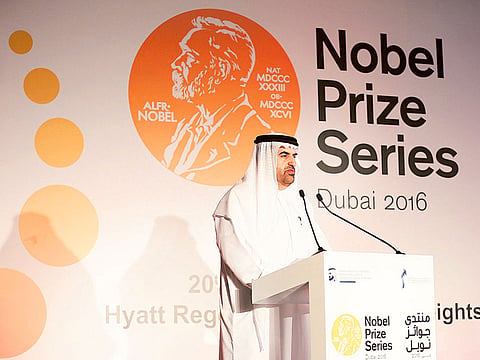Nobel laureates inspire students in Dubai
Talking to students at the Nobel Prize Series held in Dubai, three Nobel laureates tell students to never give up on their dreams

Dubai: Even Nobel prize winners have bad days when they almost gave up.
Talking to students at the Nobel Prize Series held in Dubai, three Nobel laureates told students to never give up on their dreams, adding that all experiments and findings start with failures.
The two-day interactive forum, was launched by the Mohammad Bin Rashid Al Maktoum Foundation (MBRF) as part of the Nobel Museum Exhibition 2016 in Dubai on Sunday.
“My list of failures is so long I wouldn’t know where to begin,” said George Smoot, co-winner of the Nobel Prize in Physics in 2006 for discovering the blackbody form and anisotropy of cosmic microwave background radiation.
Smoot recalled when his project was halted by Nasa following the destruction of a space shuttle Challenger. After trying so hard and fighting for his project, Nasa decided to launch the satellite proposed by Smoot which eventually deducted fluctuations in the cosmic microwave background radiation, a breakthrough in the study of the early universe.
“As a scientist, if you are not failing, you are not taking enough risks,” said Smoot who is a professor of physics and research physicist at the University of California.
Martin Chalfie, winner of the 2008 Nobel Laureate in chemistry for the discovery and development of the green fluorescent protein, said he also reached a point where he almost gave up on becoming a scientist.
“To find out about things not yet discovered, we make a lot of guesses and many of them turn out to be wrong. Failure started very early for me. I was in college and every experiment I did failed. I decided I would never be a scientist. I took on a series of jobs and was lucky enough to work in a lab, where I had a clue and my experiment did work,” said Chalfie, who is a professor at Columbia University.
Chalfie said one of the great things about failure is that you learn from them and now, as a professor, he pushes his students to remain excited and not give up.
Kurt Wuthrich, professor of structural biology at Scripps Research Institute in California who won a Nobel Prize in chemistry in 2002 for developing nuclear magnetic resonance methods for studying biological macromolecules, said each failure is productive.
“My first failure was not getting into the Olympics. I started studying my blood because I thought that it was the problem, the reason I could not make it.” After two years of research, Wuthrich became one of the prominent scientists in his country.
Talking about the significance of winning a Nobel Prize, Chalfie said the prize is an unusual one that does not focus on scientists who have the most papers but those whose research had the most impact on the world.
“It gave us scientists the opportunities that other scientists do not get. We got to meet and work with other people, students and universities,” he said.
Jamal Bin Huwaireb, managing director of the Mohammad Bin Rashid Al Maktoum Foundation ,launched the Nobel Prize Series to encourage innovation and creativity among members of the society.



